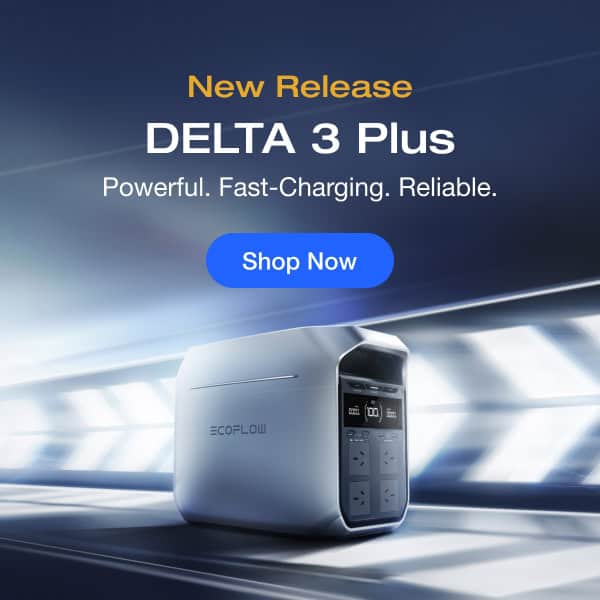Table of Contents
Ever looked at the specifications of your power bank or phone battery and felt confused by the mAh and Wh ratings? Don’t worry, this guide will break down the difference between mAh and Wh and how to convert mAh to Wh is essential for making informed decisions about portable power sources. Let’s dive in!
What Is mAh?
Before we start to know the mAh in watt-hours conversion, it is important to learn what these units actually mean. Let us start with mAh. The term “mAh” stands for milliampere-hour, it indicates how much current a battery can supply over time. Essentially, it indicates the capacity of a battery. The higher the mAh, the longer the battery can deliver power.
Imagine a small water tank that drips water steadily. The size of the tank represents the mAh value. A bigger tank (or higher mAh) means the water (or electricity) lasts longer before it runs out. Handy, right?
For instance, a power bank labeled “10,000 mAh” means it can supply 10,000 milliamperes (10 A) for one hour, 1,000 milliamperes (1 A) for 10 hours, or other combinations depending on the device’s power draw.
It is a practical number for comparing batteries, but mAh alone does not tell the full story. The battery’s voltage also determines the total energy it stores, typically measured in watt-hours (Wh).
What Is Wh?
In order to know the milliamp hours to watt hours conversion, it is essential to know what Wh means. Watt-hours measure the total energy stored in a battery. It is calculated by multiplying the battery’s voltage (V) by its capacity in ampere-hours (Ah).
Think of Wh as the total amount of water that can flow out of the tank we mentioned earlier. While mAh describes how long the tank can keep dripping, Wh tells you how much total water is inside. That is why Wh is a better metric for understanding the real power of a battery.
For example, a 100 Wh battery can power a 10 W device for 10 hours or a 50 W device for 2 hours. See how practical that is?
How to Convert mAh to Wh?
Ready to connect the dots? Knowing how to convert mAh to Wh is straightforward if you know your battery’s voltage. Here’s the formula for milliamp hours to watt hours:
Wh = (mAh × V) ÷ 1,000
Let’s break it down:
- Take the mAh rating of your battery (e.g., 10,000 mAh).
- Multiply it by the voltage (let’s say 3.7V for most lithium-ion batteries).
- Divide by 1,000 to adjust the units to watt-hours.
For example: Wh = (27,000 × 3.7) ÷ 1,000 = 99.9 Wh
Refer to the table below for a quick overview of mAh in watt hours:
| Battery Capacity (mAh) | Voltage (V) | Energy (Wh) |
| 1,000 | 3.7 | 3.7 |
| 2,000 | 3.7 | 7.4 |
| 3,000 | 3.7 | 11.1 |
| 4,000 | 3.7 | 14.8 |
| 5,000 | 3.7 | 18.5 |
| 10,000 | 3.7 | 37 |
| 20,000 | 3.7 | 74 |
| 30,000 | 3.7 | 111 |
Easy, isn’t it? This mAh to Wh conversion helps you understand how much energy a battery truly holds, allowing for smarter purchasing decisions.
How to Convert mAh to KWh?
Now that we had a look at mAh to Wh calculator, let us up the game and convert mAh to kilowatt-hours (kWh). A kilowatt-hour is 1,000 watt-hours, so you are essentially scaling up your Wh calculation. To calculate kWh usage, follow the formula:
kWh = (mAh × V) ÷ 1,000,000
Let’s try it:
- Assume a 20,000 mAh battery with a 3.7V rating.
- kWh = (20,000 × 3.7) ÷ 1,000,000 = 0.074 kWh
To provide a quick reference, here’s a conversion table to help you estimate the energy in kWh for different battery capacities (assuming a voltage of 3.7V):
| Battery Capacity (mAh) | Voltage (V) | Energy (Wh) | Energy (KWh) |
| 1,000 | 3.7 | 3.7 | 0.0037 |
| 2,000 | 3.7 | 7.4 | 0.0074 |
| 3,000 | 3.7 | 11.1 | 0.0111 |
| 4,000 | 3.7 | 14.8 | 0.0148 |
| 5,000 | 3.7 | 18.5 | 0.0185 |
| 10,000 | 3.7 | 37 | 0.037 |
| 20,000 | 3.7 | 74 | 0.074 |
| 30,000 | 3.7 | 111 | 0.111 |
These small decimal values might seem insignificant, but when applied to larger batteries or power stations, they can add up significantly. For example, the EcoFlow DELTA Pro Portable Power Station has a base capacity of 3.6 kWh, which is a much larger decimal number. It’s enough to power essential appliances like refrigerators, lights, or laptops for extended periods. Even more impressively, this capacity can be expanded to 25 kWh by connecting additional batteries. Discover how the EcoFlow DELTA Pro can redefine your energy independence and keep you powered wherever life takes you!

Conclusion
Understanding how to convert mAh to Wh does not have to be intimidating. By knowing the formulas and doing quick calculations, you can make informed decisions about batteries and power stations. With this article, you now have the knowledge to assess what works best for your needs. Whether you’re comparing batteries for portable power station devices like the EcoFlow DELTA Pro Portable Power Station or planning for larger power systems, understanding these conversions ensures you’re making the right choice.
FAQ
How long will a 100 Wh battery last?
The runtime of a 100 Wh battery depends on your device’s power consumption. For example, if your device uses 20 W, the battery will last 5 hours (100/20 = 5). For a device consuming only 5 W, it would last 20 hours (100/5 = 20). Lower-power devices run longer, while higher-power devices drain the battery faster. Simply divide the battery’s watt-hours by your device’s wattage to estimate runtime accurately.
How many watts is a 10,000 mAh battery?
To calculate the wattage of a 10,000 mAh battery, you need to multiply the mAh by the voltage (V) and divide by 1000. For example, a 10,000 mAh battery at 3.7V would be: (10,000 mAh × 3.7V) ÷ 1000 = 37Wh. So, a 10,000 mAh battery at 3.7V is approximately 37 watt-hours (Wh). If the voltage is different, adjust the calculation accordingly.
Is a higher mAh battery more powerful?
A higher mAh rating means the battery can hold more charge, allowing it to power a device for a longer time. While a larger mAh battery can provide more energy, it doesn’t necessarily mean it’s more powerful. It simply has a greater capacity to store and supply energy. However, a higher mAh battery will generally take longer to charge due to its larger battery capacity.


